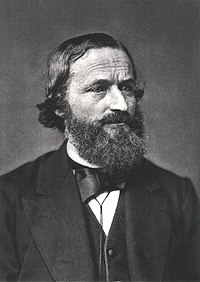German physicist (1824–1887) From Wikipedia, the free encyclopedia
Gustav Robert Kirchhoff (12 March 1824 – 17 October 1887) was a German physicist who contributed to the fundamental understanding of electrical circuits, spectroscopy, and radiation by heated objects. He coined the term black body radiation in 1862.[1]
Gustav Kirchhoff | |
|---|---|
 Gustav Kirchhoff | |
| Born | 12 March 1824 |
| Died | 17 October 1887 (aged 63) |
| Nationality | Prussian |
| Alma mater | University of Königsberg |
| Known for | Kirchhoff's circuit laws Kirchhoff's law of thermal radiation Kirchhoff's laws of spectroscopy Kirchhoff's law of thermochemistry |
| Awards | Rumford medal |
| Scientific career | |
| Fields | Physics |
| Institutions | University of Berlin University of Breslau University of Heidelberg |
| Doctoral advisor | Franz Ernst Neumann |
He proposed two sets of independent concepts in both circuit theory and thermal emission. They are all called 'Kirchhoff's laws' after him, as well as a law of thermochemistry. The Bunsen–Kirchhoff Award for spectroscopy is named after him and his colleague, Robert Bunsen. He also discovered rubidium with Bunsen in 1861.
Seamless Wikipedia browsing. On steroids.
Every time you click a link to Wikipedia, Wiktionary or Wikiquote in your browser's search results, it will show the modern Wikiwand interface.
Wikiwand extension is a five stars, simple, with minimum permission required to keep your browsing private, safe and transparent.